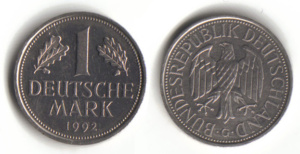FX clearing will remain in London – Deutsche Boerse’s ‘cunning plan’ is noise and has no basis
Under no circumstances will FX clearing be moved to Europe, despite Eurex’s plan – unveiled today – to give banks part of its revenues, and even make board appointments in what is very much a conflict of interest. We delve deep into why this will never happen and London can hold its head high

“A merger of equals”, boasted Frankfurt’s pro-acquisition elite in the overly sensationalized attempts by Deutsche Boerse to create the largest margin pool in the world by joining commercial forces with London Stock Exchange.
Throughout the entire negotiation period, which was peppered with inabilities to come to an agreement on both sides of the English Channel, as well as extreme differences in opinions from major political entities in Germany and England, FinanceFeeds maintained categorically that no merger would take place.
Today, the printed matter which adorns seat space on the London Underground is awash with more left-leaning inference that Deutsche Boerse has plans to move the interbank and institutional clearing of FX to Germany from its absolute global heartland, Central London.
There are two potential responses to such a preposterous presumption, the first being to disregard it and banish it from memory, the second being to consider it an attempt at humor, intended by the kind gentleman of Fleet Street to brighten up the daily commute on an autumnal Monday morning.
Eurex, which is a Frankfurt-based clearing house owned by Deutsche Boerse, has revealed its program to award its largest customes a share of its revenues, which has been construed by the pro-Europe mainstream publications in London as an attempt to incentivize large institutions to conduct their clearing in mainland Europe rather than in London.
In a statement today Eurex Clearing said its 10 most active participants will be eligible for a “significant share” of the returns from its multi-currency interest rate swap offering, as well as being offered seats on its board.
Deutsche Boerse has boldly claimed that Bank of America Merrill Lynch, Citigroup, Commerzbank, Deutsche Bank, JP Morgan and Morgan Stanley have all signed up to the program, adding to the existing 200 clients which Deutsche Boerse claims Eurex currently has on board.
Indeed, these are major Tier 1 FX dealing banks, and yes they may well have signed up to the program, but that absolutely does not indicate a priority to clear all their trades in Germany.
No Tier 1 bank would even consider doing that, and LCH Clearnet’s firm, London-based OTC FX clearing customer base will remain absolutely undiminished.
“This market-led initiative will benefit clients and the broader market place through greater choice and competition, improved price transparency as well as reduced concentration risk,” said Eric Mueller, Eurex’s chief executive.
Competition is not fostered by offering conflicting ownership stakes in clearing houses which are located far from the mainstay of interbank dealing and have no place in this industry’s global topography or infrastructural considerations.
The impending MiFID II rulings, set forth by pan-European regulatory authority ESMA require all venues, Deutsche Boerse being one of them, to report their trades as Regulated Marketplaces (RM), and will ensure that favorable advantages such as the sharing of the revenues of a trading venue with its participants, or offering shares in an RM to its customers are not permitted, as it creates the possibility of not providing the same terms to each participant, thus is not able to operate as an impartial centralized marketplace or counterparty.
That aside, Eurex already handles the vast majority of contintenal European trade clearing, yet is absolutely insignificant when compared to LCH.Clearnet’s clearing volumes in London.
Deutsche Boerse is well aware of this, so realizes that the string it has in its bow is an ability to lobby the European Cental Bank to ensure Euro clearing can be moved to Germany, this ideology being partly down to an escalating war between London and the European Union over euro clearing, with the City of London currently handling over 90% of Euro clearing.
Looking at the history of the failed merger between London Stock Exchange and Deutsche Boerse, it was clear that clearing dominance was part of Frankfurt’s agenda.
FinanceFeeds has been privy to information during the course of the proposals to merge the two venues that as a result of research by the European Commission, a merger would create the world’s largest margin pool with a value of 150 billion euros, therefore could impede competition for smaller trading venues that rely on LCH.Clearnet as well as other firms that offer similar collateral settlement services.
Germany. The non-entity that wants complete power
On that basis, London Stock Exchange’s response was to make a quick attempt to sell LCH SA in order to address proactively any anti-trust concerns. LCH Group which holds the European subsidiary LCH SA is 57% owned by the London Stock Exchange, with the remainder being owned by other users of the service.
It is ironic that the concerns of Lord Myners and other senior London officials with lifelong careers in the exchange traded derivatives sector in the largest financial center in the world were ignored by Germany, and that it has taken a report by the anti-business and staunch socialist European Commission whose interests are anti-British to stifle a potentially harmful merger which would have placed the control one of London’s fine institutions in Frankfurt, which is absolutely nowhere on the world’s financial markets and electronic trading stage.
The desperation that had now come about by the end of last year had been sensed by Euronext, which was one of the key suitors for the purchase of LCH SA, for which London Stock Exchange wants £430 million, and has to sell it in order to put paid to the investigation into any potential anti-competitive nature of the proposed deal, and quite frankly to just get on with it.
In late October last year, JPMorgan Cazenove was enlisted to oversee the sale of LCH SA, and all looked set to head to market and find a suitable acquirer, with Euronext being in the lead because it contributes around half of the revenue of LCH SA in clearing business from France, Holland, Portugal and Belgium.
Euronext appeared at the time to realize its position of strength in that it is strategically and operationally the most suitable acquiring party, and the shortlist of alternatives that would buy LCH SA is dwindling, however, Euronext made it clear that it would not pay one penny for LCH SA. FinanceFeeds held the opinion at the time that this in itself represented a potential cartel in that clearing across all electronic trading via these two entities will become intertwined.
Therefore, even if that deal had gone ahead and was not a cash transaction, it would not matter if LCH SA was given to Euronext for free, as it would remove the one obstacle that is in the way of London Stock Exchange and Deutsche Boerse creating a massive margin pool whilst their perceived moves toward lobbying the FCA to restrict the core business activities of OTC participants makes for an effortless sweep in which the entire business can be moved to their books.
Deutsche Boerse has had OTC FX in its sights for some time, one example being the acquisition by Deutsche Boerse in July 2015 of FX trading platform 360T for $796 million.
Further examples of this have been demonstrated, some dating back several years. Back in 2011, Deutsche Boerse took a minority stake in British FX technology solutions provider Digital Vega which was a technology vendor to buyside and sellside firms in the OTC derivatives sector.
At that time, the idea was to increase Deutsche Boerse’s positioning in the provision of pre-trade price transparency in the derivatives area for institutional investors and taking an initial footprint in the FX derivatives space. An investment agreement was signed in February this year, whereby Deutsche Börse would pay a US dollar amount in the single digit million range.
Thus, this interest is quite clearly part of the overall strategy, and with the sale of LCH SA to one Euronext which serves the purpose of removing the EU concerns about monopolies, yet serves to empower the listed derivatives industry just as much as if it was retained, the strategy is laid out for the year ahead.
Several politicians in the state of Hesse, where Deutsche Boerse is based, have continually refused to accept anything other than moving the headquarters of what would have been a newly merged entity to Frankfurt, and Thomas Schaefer, finance minister in Hesse, recently said it was “crystal clear” after the UK Brexit vote that this HQ should be in Frankfurt.
A less than credible venue would be one located in Frankfurt rather than Paternoster Square, in terms of infrastructure, participation in institutional financial markets globally, and in terms of talent and alignment with key venues in Asia and North America. Quite simply, central Europe is a backwater by comparison, and hampered by bureaucracy, debt and lack of dynamism.
Baron Paul Myners CBE, who served as Financial Services Secretary to the Treasury between October 2008 and May 2010 under the Labor government of the time and has several senior executive positions behind him which were within large institutions including NatWest and RBS, as well as Lord Rothschild’s RIT Capital Partners where he serves as a board member since August 2010, has a vested interest in the merger, as he was appointed Chair of Governors at the London Stock Exchange in 2014.
In particular, Lord Myners, along with senior regulators in London, had concerns all throughout the negotiation process relating to how clearing operations could have been expanded across both exchanges.
According to laws in America and Europe, notably the Dodd-Frank Wall Street Reform Act and the EMIR (European Market Infrastructure Regulation), exchange-traded swap contracts must be cleared through specific electronic clearing houses, a process which engenders greater transparency and in the case of London Stock Exchange, its own subsidiary LCH.Clearnet is used for this purpose.
Undercaptalization
The case in point here is that nowadays, with large banks better capitalized, transactions are now being passed to institutions with very little capital at all therefore if large trades went wrong, there could be massive exposure, and as a result, a question mark hangs over the corporate governance of a new entity consisting of the London Stock Exchange and Deutsche Boerse with its head offices in two separate countries, which could lead to a shirking of responsibilities by British and European regulators, or a degree of buck-passing. Counterparty risk is, after all, a very important subject post SNB EURCHF peg removal.
The incumbent Chairman of the Treasury Select Committee Andrew Tyrie has been on the fence for some time regarding the potential British exit from the European Union, however he has been vocal regarding the standardized EU regulations across all industry sectors, stating that there is absolutely no reason to fear a standard EU ruling on all industry matters.
Indeed, Mr. Tyrie’s perspective on this matter is evident here, as he does not fear the potential difficulties which could arise from a merger between Britain and Germany’s flagship traditional exchanges, as it would appear to be manageable via standardized regulation.
However, if something does go awry and hand-wringing occurs between German and British regulators, then the effect on the Square Mile could be potentially vast. On this basis, politics should be left aside in favor of business acumen and suitability for purpose.
Seasoned London-based critics including prominent City journalist Alex Brummer, author of several books including “The Crunch” which looked closely at the reasons behind the 2008 credit crisis, have regaled indications from regulators that the sentiment within the offices of the authorities is that the merger proposals between London Stock Exchange and Deutsche Boerse have taken place over ‘cosy tea parties.’
London Stock Exchange acquired Borsa Italiana in 2007, during which time FinanceFeeds CEO Andrew Saks-McLeod spoke to then incumbent London Stock Exchange CFO Jonathan Howell at the London Stock Exchange’s then-new Paternoster Square headquarters.
At that time, Mr. Howell explained that, whilst time consuming, the acquisition was indeed that – a pure acquisition in which London Stock Exchange would become the owner of the Italian stock exchange, making its corporate decisions from London, a far easier way to manage a large entity, however with the uncertainty of future cross-border regulation in the advent of the Brexit, and an ‘equal’ merger between a British and German exchange, governance may well be somewhat different.
Business as usual chaps.









